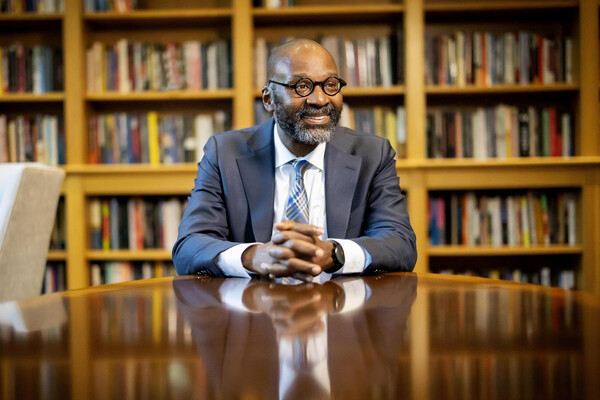
Griffin Pitt, right, works with two other student researchers to test the conductivity, total dissolved solids, salinity, and temperature of water below a sand dam in Kenya.
(Image: Courtesy of Griffin Pitt)
In the age of COVID-19, many of us are adjusting to the new realities of mask-wearing, social distancing, and remote interactions around work, school, and social gatherings. But for those who are especially vulnerable, these practices are not new.
Rebecca Mueller, a Ph.D. student in history and sociology of science in the School of Arts & Sciences, has been writing a history and ethnography of the cystic fibrosis (CF) community and says the pandemic has further marginalized those with the disease, but also has opened doors for greater connection.
“What’s interesting is that the CF community is already somewhat accustomed to operating at a social distance, and already has some of those skills and infrastructure in place,” says Mueller. “The pandemic has emphasized the ways that people with CF are different, in the sense that many are staying in quarantine longer and have different needs for social support, which the community was already well-equipped to address. And then, there’s a way in which areas that had been off-limits for certain people with CF have opened up.”
Cystic fibrosis is a genetic, lifelong condition that primarily affects the pulmonary system with a persistent thick mucus that causes congestion and leaves people vulnerable to infection by opportunistic pathogens that are prevalent in the environment but do not affect healthy people. People with CF can suffer decline in lung function as well as gastrointestinal dysfunction.
The elevated risk had come from a microbe called Burkholderia cepacia, which was being developed for use in agriculture and industry.
“Because individuals with CF are susceptible to these microbes, they share similar vulnerabilities,” says Mueller. “And it became clear over time that they could infect one another, and that they should therefore be kept separated.”
She says that, ultimately, the Cystic Fibrosis Foundation advocated to have the Environmental Protection Agency regulate the microbe more tightly in a way that reduced its use in agriculture. It now rarely causes infection in people with CF.
“To me, it was just this fascinating story of the genome and the biome,” she says. “It seemed like a great case study for thinking through the implications of genetic disease and microbiome research, which is a new area studying the many bugs and viruses that inhabit our bodies. That’s what led me to devote years to this question of the CF community and how it’s been changed because of the risk of infection.”
Mueller thinks her research on the CF community offers several lessons for the COVID-19 pandemic.
“The first is that digital sociality, these online forms of community, the options to attend conferences or work virtually are actually more inclusive for a subset of people with disabilities,” she says. “My hope is that COVID-19 has a lasting impact on how we work and live by providing these more inclusive options over the long term.”
This story is by Jane Carroll. Read more at Omnia.
From Omnia

Griffin Pitt, right, works with two other student researchers to test the conductivity, total dissolved solids, salinity, and temperature of water below a sand dam in Kenya.
(Image: Courtesy of Griffin Pitt)

Image: Andriy Onufriyenko via Getty Images

nocred

Provost John L. Jackson Jr.
nocred